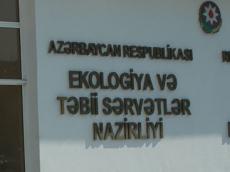|
|
TODAY.AZ / Society
Employees of Azerbaijan’s Ministry of Ecology attends int'l conference
05 March 2013 [16:44] - TODAY.AZ
 Delegation of the Azerbaijan’s Ministry of Ecology led by Deputy Minister Rauf Hajiyev participates in the 16th meeting of the Conference of the Parties to the Convention on International Trade in Endangered Species of Wild Fauna and Flora (CITES) in Bangkok, Thailand.
Delegation of the Azerbaijan’s Ministry of Ecology led by Deputy Minister Rauf Hajiyev participates in the 16th meeting of the Conference of the Parties to the Convention on International Trade in Endangered Species of Wild Fauna and Flora (CITES) in Bangkok, Thailand.The meeting will continue until 14 March 2013. CITES COP16 will address a number of substantive issues on trade of endangered species, including: amendments to the Appendices of the Convention which lists a number of species listed as controlled species due to their risk of extinction. The COP was inaugurated by Her Excellency Yingluck Shinawatra the Prime Minister of Thailand.
This year also celebrates the 40th anniversary of the Convention and coincidently is the first COP of CITES Maldives has participated in. Maldives submitted the Instrument of accession to CITES on the 12 of December 2012 and will be an official party to the convention from 12 of March 2013.
CITES is a multilateral agreement between 178 States which aims to safeguard the conservation and sustainable exploitation of the planet’s animal and plant populations. Signed in Washington in 1973, the Convention is due to celebrate its 40th anniversary this year in Bangkok. Besides being one of the 178 Parties, Switzerland plays a special role within CITES as the Depositary state and host to the CITES Secretariat. It also has a strong interest in seeing that the Convention is implemented properly and effectively, as the country that issues the most CITES certificates for its booming watchmaking industry and its luxury goods industry. According to how threatened with extinction they are, CITES species are grouped into three categories benefiting from different levels of protection. Depending on the category, the import and export of live specimens of plants or animals or parts thereof are either prohibited or subject to licensing.
The Conference of the Parties meets every three years and spends in excess of ten days discussing numerous applications from every country and continent. Among the 71 requests and over a hundred documents submitted this year, the issue of the African elephant and trade in its ivory features once again. Switzerland is concerned about the increase in cases of poaching and intends to commit itself to supporting countries of origin in their fight against this problem, but also to supporting the measures taken in consumer countries. Rhino poaching too is constantly on the rise. Rhinoceros horn is highly prized by consumers in certain Asian countries for its claimed anti-cancer properties. There too, effective measures should be taken to support countries of origin while educating those which are the source of demand. With regard to reptiles, and snakes in particular, a group led by Switzerland is examining the traceability and sustainability of the Asian snake trade. In parallel with the discussions that have taken place within CITES, Switzerland has set up a committee of experts responsible for proposing recommendations on the humane slaughter of reptiles.
/AzerTAc/
URL: http://www.today.az/news/society/119927.html
 Print version
Print version
Views: 1472
Connect with us. Get latest news and updates.
See Also
- 16 January 2026 [11:51]
Over 6 kg of narcotics seized in Tovuz, two detained - 15 January 2026 [14:54]
Turkiye backs Zangazur Corridor according to Azerbaijan’s plans, says FM Hakan Fidan - 15 January 2026 [14:46]
Azerbaijan, Vietnam explore joint opportunities in electric vehicle production - 15 January 2026 [14:13]
Azerbaijan establishes Western Industrial Park - decree - 15 January 2026 [12:14]
Baku conference to spotlight racism and violence against Sikhs in India - 15 January 2026 [12:08]
Pakistan launches ASAN Service Center in Islamabad with Azerbaijan’s support - 15 January 2026 [11:50]
US visa restrictions expand to 75 countries, affecting Azerbaijan and South Caucasus states - 14 January 2026 [15:19]
Azerbaijan participates in 298th IPU Executive Committee Session in Doha - 14 January 2026 [11:24]
Interviews begin for WUF13 Volunteer Program in Baku - 14 January 2026 [11:02]
Armenia publishes framework for TRIPP transit route
Most Popular
 Armenia is reforming the army: revanchists are worried
Armenia is reforming the army: revanchists are worried
 Azerbaijan launches desalination of Caspian water - innovations and international experience
Azerbaijan launches desalination of Caspian water - innovations and international experience
 Fuel shortage has hit Yerevan - what prevents it from turning to Azerbaijan?
Fuel shortage has hit Yerevan - what prevents it from turning to Azerbaijan?
 Baku conference to spotlight racism and violence against Sikhs in India
Baku conference to spotlight racism and violence against Sikhs in India
 NATO allies deploy troops to Greenland as Trump’s annexation threats strain alliance
NATO allies deploy troops to Greenland as Trump’s annexation threats strain alliance
 London, Ankara signal deeper trade and defence cooperation
London, Ankara signal deeper trade and defence cooperation
 Azerbaijan, Vietnam explore joint opportunities in electric vehicle production
Azerbaijan, Vietnam explore joint opportunities in electric vehicle production
